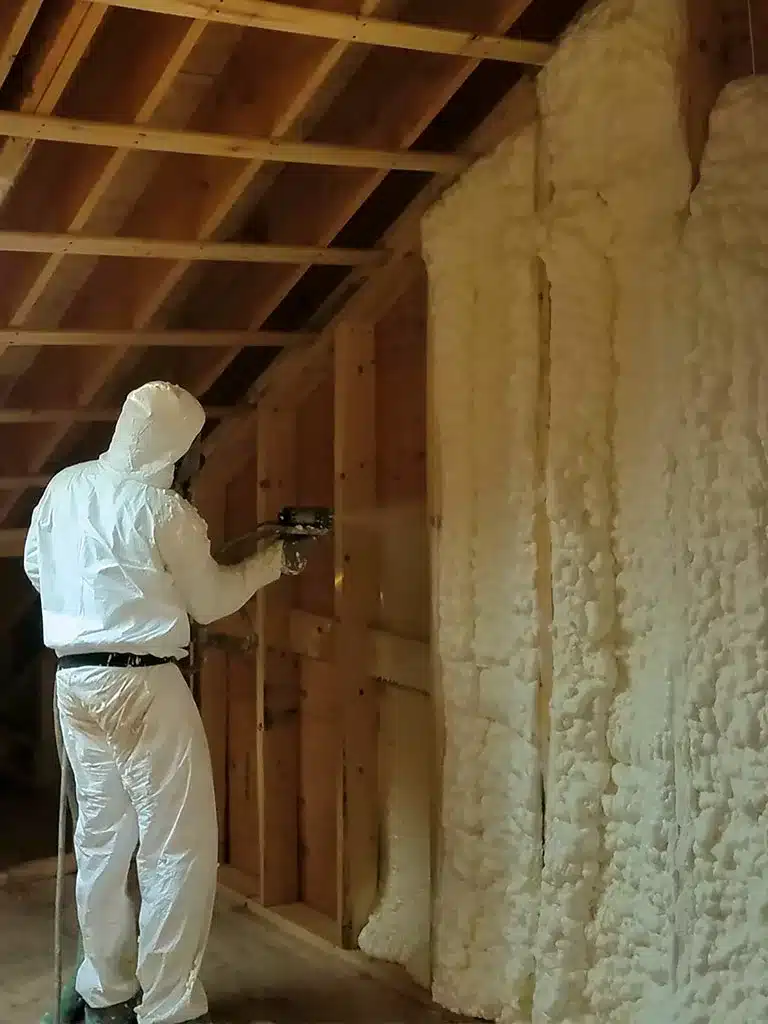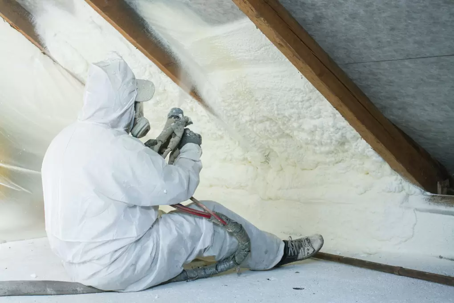Comparing Spray Foam to Typical Insulation: Which Is Better?
Comparing Spray Foam to Typical Insulation: Which Is Better?
Blog Article
Spray Foam: The Ultimate Option for Air Sealing and Insulation
Spray foam insulation has actually arised as a leading option for reliable air sealing and thermal insulation, offering an unique mix of homes that establish it apart from typical approaches. Understanding the full range of its benefits, installment procedures, and contrasts with various other insulation kinds is crucial for making informed choices.
What Is Spray Foam?
Spray foam is a functional insulation product that incorporates the principles of air sealing and thermal resistance to improve energy effectiveness in buildings. Made up largely of polyurethane or various other similar substances, spray foam is used as a liquid that expands upon call with surface areas, developing a solid, continual layer of insulation. This one-of-a-kind residential property enables it to load voids, fractures, and spaces that traditional insulation products may ignore, supplying a premium air seal.
There are two main sorts of spray foam: open-cell and closed-cell. Open-cell spray foam is lighter and a lot more versatile, supplying exceptional noise absorption and a lower R-value per inch - Spray Foam. In contrast, closed-cell spray foam is denser, supplying a higher R-value, dampness resistance, and added architectural honesty to developing elements
The application procedure normally entails specific devices, guaranteeing a seamless application that follows different substratums, including steel, concrete, and timber. This flexibility makes spray foam ideal for both new buildings and retrofitting existing frameworks. Its ability to develop a closed barrier substantially adds to lowering energy intake and boosting interior air top quality, thus making it a recommended choice amongst homeowners and home builders alike.
Advantages of Spray Foam Insulation
Among one of the most significant advantages of spray foam insulation is its exceptional ability to produce a continuous air obstacle, which effectively reduces power loss. Unlike conventional insulation products, spray foam expands to fill up fractures and spaces, making sure that air leakage is considerably decreased. This particular not only boosts power performance yet additionally causes lower energy bills over time.
In addition, spray foam insulation provides remarkable thermal resistance, adding to an extra steady indoor atmosphere. Its high R-value per inch permits efficient insulation in confined rooms, making it excellent for attics, walls, and crawl spaces. Additionally, the moisture-resistant properties of spray foam assistance avoid mold and mildew and mold development, advertising much healthier living conditions.
One more vital advantage of spray foam insulation is its sound-dampening high qualities (Spray Foam). It effectively lowers sound transmission between rooms, creating a quieter and extra comfortable home atmosphere. The resilience of spray foam likewise attracts attention, as it does not sag or settle gradually, preserving its efficiency throughout its lifespan
How Spray Foam Works
Recognizing how spray foam insulation functions is important for valuing its effectiveness in air securing and thermal resistance. Spray foam insulation includes two primary parts: isocyanate and polyol material. When these elements are mixed, they undergo a chemical reaction that causes the product to broaden rapidly, creating a dense foam that fills up voids, dental caries, and splits.
As the foam expands, it sticks to surfaces, developing an impermeable seal that significantly decreases air seepage. This characteristic makes spray foam insulation very reliable at stopping drafts and dampness infiltration, which can cause power loss and damages with time. Furthermore, the closed-cell version of spray foam provides superior thermal resistance because of its inflexible structure, efficiently minimizing warmth transfer.
The special residential or commercial properties of spray foam allow it to comply with uneven surfaces, making certain comprehensive coverage and a seamless obstacle. Therefore, spray foam insulation not only improves energy effectiveness but also adds to enhanced interior air high quality by decreasing the buildup of allergens and toxins. Inevitably, comprehending the auto mechanics behind spray foam emphasizes its function as a premium choice for insulation and air sealing in both domestic and industrial applications.
Setup Process Review

Prior to installation, the room needs to be sufficiently cleansed and prepped, guaranteeing that surface areas are devoid of particles, wetness, and dirt. This step is important since pollutants can endanger adhesion and total efficiency. When the area is prepared, the application involves blending both elements of the spray foam, which expands upon contact and loads gaps efficiently.
Educated professionals must carry out the setup, using specific tools to make certain uniform protection and optimum density. Security precautions, consisting of wearing protective equipment and making sure proper ventilation, are imperative throughout this process. After application, the foam commonly treatments swiftly, developing a solid barrier that boosts power efficiency.
Comparing Spray Foam to Standard Insulation
When reviewing insulation choices, spray foam insulation stands out in comparison to conventional products such as fiberglass and cellulose. Unlike fiberglass and cellulose, which can allow air infiltration, spray foam broadens upon application, filling up gaps and gaps to develop an great post to read impermeable seal.
Furthermore, spray foam provides a greater R-value per inch than typical insulation types, using even more efficient thermal resistance in a thinner profile. This particular is especially valuable in rooms with minimal cavity depth. Furthermore, spray foam is immune to dampness and mold and mildew development, which can be a considerable interest in cellulose and fiberglass, especially in humid environments.
Nonetheless, spray foam insulation generally carries a higher in advance price than its conventional equivalents. Property owners should evaluate this preliminary financial investment versus long-term energy financial savings and performance advantages. Inevitably, while both insulation kinds offer their objective, spray foam becomes an advanced solution for modern insulation demands, specifically in regards to air securing and thermal performance.

Final Thought
In recap, spray foam insulation stands for a highly reliable solution for achieving optimal air sealing and thermal resistance. Its unique residential or commercial properties, consisting of wetness resistance and audio dampening, make it suitable for various applications in both brand-new constructions and retrofitting jobs (Spray Foam). The preliminary prices may be greater contrasted to standard insulation materials, the long-lasting advantages, such as substantial power cost savings and enhanced indoor air quality, validate the investment and highlight its worth in modern-day building methods.
Spray foam insulation has actually emerged as a leading option for reliable air sealing and thermal insulation, using an one-of-a-kind combination of buildings that set it apart from standard methods.Spray foam is a flexible insulation product that combines the concepts of air sealing and thermal resistance to enhance energy efficiency in buildings.When evaluating insulation options, spray foam insulation stands out in comparison to traditional products such as fiberglass and cellulose. Ultimately, while additional info both insulation types offer their function, spray foam arises as an extra sophisticated service for modern-day insulation demands, specifically in terms of air securing and thermal effectiveness.
In summary, spray foam insulation represents a very efficient remedy for attaining ideal air securing and thermal resistance.
Report this page